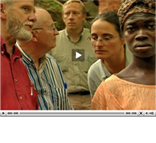

Further Reading
Wrestling with Race and Racism
www.inheritingthetrade.com – Tom DeWolf (featured in the film) has written his own account of wrestling with the family legacy and what he learned from the trip retracing the Triangle Trade. The book’s website includes Tom’s blog and chances to engage in discussion with the author.
www.pbs.org/pov/pov2002/twotownsofjasper/resources02.html – The website for Two Towns of Jasper, featured on POV in 2002, provides an excellent set of links related to race, racism, privilege, dialogue, and healing.
www.beyondintractability.org – Beyond Intractability is a conflict resolution project at the University of Colorado. The website has amassed a collection of hundreds of essays, handbooks, interviews, and organizational links related to the process of reconciliation and various approaches to conflict resolution around the world.
History
www.slavenorth.com – One of the few histories available entirely online. Historian Douglas Harper provides a state-by-state overview of slavery in the North. His footnotes provide a good bibliography of major historical works that have focused on the North’s role in the U.S. slave trade and practice of slavery.
Joanne Pope Melish, who is featured in the film, has written Disowning Slavery: Gradual Emancipation and Race in New England, 1780-1860 (Cornell University Press, 1988)
Anne Farrow, Joel Lange, and Jenifer Frank. Complicity: How the North Promoted, Prolonged, and Profited from Slavery (Ballantine Books, 2005) – Written by journalists, this book is a relatively easy read.
Jay Coughtry. The Notorious Triangle Trade: Rhode Island and the African Slave Trade, 1700-1807 (Temple University Press, 1981) – Because of its focus on Rhode Island, this is a key resource for this film.
Ron Bailey,: “The Slave(ry) Trade and the Development of Capitalism in the United States – The Textile Industry in New England” (1990) A seminal article on the importance of slavery.
Repair
www.house.gov/conyers/news_reparations.htm – On this site, Representative John Conyers explains H.R. 40, a bill that calls for a commission to study the history and legacy of slavery and Jim Crow and possible remedies. The site also provides links to the bill and related discussion.
http://findarticles.com/p/articles/mi_qa3843/is_200301/ai_n9233895?tag=rel.res1 – This link takes you to a 2003 article by legal scholar, Charles Ogletree, Jr. from the University of Memphis Law Review, “Reparations for the Children of Slaves: Litigating the Issues”
Privilege
www.nymbp.org/reference/WhitePrivilege.pdf – Peggy McIntosh’s “White Privilege: Unpacking the Invisible Knapsack” is a classic article describing white privilege and a good starting point for those who are new to the concept. At this link you can read part of the article for free. We strongly recommend purchasing a copy of the full text that is part of “White Privilege and Male Privilege: A Personal Account of Coming to See Correspondences Through Work in Women’s Studies,” available at www.wcwonline.org/component/option,com_virtuemart/page,shop.browse/category_id,247/Itemid,175/ and all proceeds benefit the National SEED Project on Inclusive Curriculum (Seeking Educational Equity & Diversity).
http://uts.cc.utexas.edu/~rjensen/freelance/whiteprivilege.htm – In this essay, journalism professor Robert Jensen expands on McIntosh’s ideas and describes how he experiences white privilege in his life.
http://www.tolerance.org/news/article_tol.jsp?id=722 – In his brief article, “White Privilege: Swimming in Racial Preference,” anti-racist activist Tim Wise gives a selected historical overview of common practices that have favored whites.
www.aecf.org/KnowledgeCenter/PublicationsSeries/RaceMatters.aspx – The Annie E. Casey Foundation’s “Race Matters” toolkit includes materials and strategies to help people from a wide range of professions and perspectives examine privilege.
